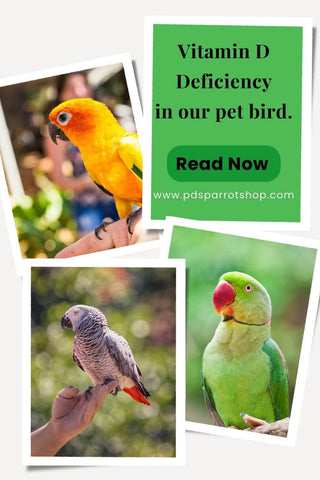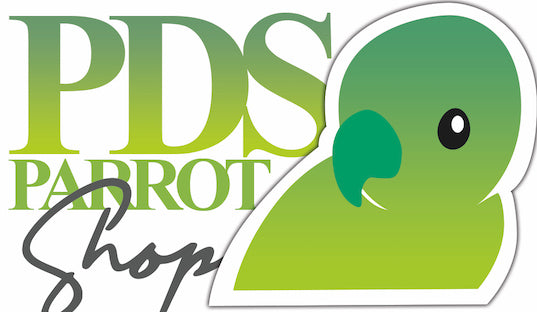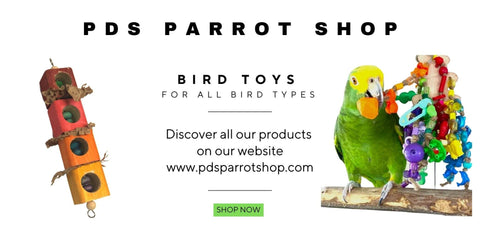
Vitamin D Deficiency In Our Pet Bird
Share
Vitamin D is an essential nutrient for parrots, so it's important to make sure that they get enough of it. To properly care for your bird and keep them healthy, learn more about diet and Vitamin D intake from this resource.

Reasons for Vitamin D Deficiency in Birds:
Two reasons why there is a deficiency, lack on direct sunlight and lack of vitamin D in food. Birds that are kept indoors with limited exposure to sunlight are at a higher risk for vitamin D deficiency. A lack of exposure to sunlight, as vitamin D is produced in the skin when exposed to sunlight. Sunlight is the best source of vitamin D.
Birds that are fed a diet of mostly a vegetarian diet are also at a higher risk for vitamin D deficiency. This is because veggies, greens, and grains are not a good source of vitamin D. Vitamin D is found in certain foods like fishes and fortified food which are usually not recommended for parrot. Additionally, some medical conditions can lead to vitamin D deficiency, such as liver or kidney disease.
In nature, parrots would typically get vitamin D from insect rich diet and therefore your pet birds often need help obtaining essential nutrients like vitamin D. Most enrich food with vitamin D are liver, salmon, and eggs; however, meat products have been a controversial subject for parrot health. Therefore vitamin D supplements and sunlight is key.
Symptoms of Vitamin D Deficiency
There are several symptoms of vitamin D deficiency in pet birds. These include soft bones, weakness, muscle atrophy, and depression. If you notice any of these symptoms in your bird, it's important to take them to the vet for a check-up. Vitamin D deficiency can be a serious health problem, but it is treatable with sunlight and/or a change in diet.
If you notice any of these symptoms in your bird, it's important to take them to the vet for a check-up. Vitamin D deficiency can be a serious health problem, but it is treatable with sunlight and/or a supplement.
Importance of Vitamin D in Birds
Vitamin D is essential for many aspects of health in our pet birds, yet vitamin D deficiency is a common problem. Vitamin D has an integral role in the body, one of which being that it helps to synthesize Calcium, a vital mineral to the body. Consequently, Calcium plays an important part in bone reinforcement as well as normal functioning of the nervous system and maintain mood equilibrium. A lack of these two minerals can be life-threatening in birds and potentially lead to mortality via organ damage or deformations of skeletal features. Furthermore, research shows that deficiencies of Vitamin D and Calcium may cause many painful diseases like autoimmune conditions and osteoporosis. To ensure a healthy bird it’s prudent that you take into account their dietary consumption of both Calcium and Vitamin D.
A common manifestation of vitamin D deficiency is the occurrence of mood disorders, which are known to increase the risk of feather plucking in birds. It is important for owners to make sure their avian companions receive sufficient levels of vitamin D from a balanced diet.
How to prevent Vitamin D in birds?
1) Spending time in the sunlight
2) Pellets ( use as a supplement)
3) Vitamin D Supplement with vet recommendation
Aviary for Sunlight
An outside aviary is an excellent way to keep birds happy, give them sunlight, and safety. Aviary isn't for everyone and requires time, space, and money. If an aviary isn't in the cards, a flight suit for avians is a great way to take your bird out for a walk on sunny days.
Pellets and Vitamin D
Premium pellet diets are often have adequate levels of vitamin D for birds however this doesn't mean your parrot can't be deficient. This is due to a combination of birds having difficulty absorbing vitamins from their food, as well as diets without proper fat. To absorb nutrients better it is important to supplement with Vitamin D3 and/or increasing fat intake.
Vitamin D Supplements
Vitamin D absorption needs fatty acids. So supplementation with vitamin D and fatty acids such as flax seed oil, red palm oil, and coconut oil will aid in the absorption of nutrients. Please ask your vet before starting any supplements and getting the proper dose for your parrot size, type and environment.
UVA lights can be safe for birds
Bird bulbs are specially designed lights that provide UVA and UVB rays, replicating the natural sunlight birds would experience in the wild. Unlike standard household lighting, these bulbs support mental stimulation, healthy behavior, and vitamin D3 production, which is essential for calcium absorption and bone health. When used correctly, bird bulbs are a safe and effective way to enrich your parrot’s indoor environment.
What Are UVA Lights?
- Birds can see ultraviolet (UV) light, which humans cannot.
- UVA (320–400 nm) and UVB (290–320 nm) lights mimic natural sunlight.
- UVA light enhances color perception, mood, and behavior, while UVB is necessary for vitamin D3 synthesisand calcium absorption.
Benefits of UVA Lights for Birds
- Improved behavior: Birds are more active, playful, and socially engaged.
- Enhanced color perception: Helps birds recognize mates, food, and environmental cues.
- Enrichment: Simulates natural sunlight, especially in indoor environments.
Safety Considerations
- Use bird-specific UVA/UVB bulbs: Avoid tanning lamps or reptile bulbs that aren’t designed for birds.
- Maintain proper distance: Keep bulbs at the recommended distance specified by the manufacturer. Too close can overexpose your bird.
- Limit exposure: See Manufactures Guide; don’t leave lights on 24/7.
- Include shaded areas: Let your bird choose to move away from the light if they want. Birds naturally seek shade in the wild.
- Monitor your bird: Look for signs of eye irritation, squinting, or unusual behavior when first introducing the light.
Recommended Practices
- Combine UVA lighting with normal daylight exposure when possible.
- Choose full-spectrum bird lamps that include both UVA and safe UVB output.
- Keep a daily schedule for lights to mimic natural day/night cycles.
- Properly installed avian-specific UVA lights are generally safe and beneficial for mood, behavior, and enrichment.
- Eye problems usually arise from incorrect bulbs, excessive intensity, or constant exposure.
- Always prioritize bird-specific lighting, correct placement, and giving your bird control over their exposure.
Vitamin D is essential for your bird’s bone health, calcium absorption, and overall well-being. A deficiency can lead to serious problems, including weak bones, poor feather quality, and metabolic disorders. By providing a balanced diet rich in Vitamin D and ensuring access to safe natural sunlight or avian-specific UVB lighting, you can help prevent deficiency and support your bird’s long-term health. Regular observation and consultation with an avian veterinarian are key to catching any issues early and keeping your pet bird strong, healthy, and active.
More Articles about Bird Health
Vitamins support everything from metabolism to neurological function in birds. A clear understanding of vitamin deficiencies in birds and their early indicators supports proactive, informed care rather than reactive treatment.
Monika Sangar
Co-founder of Prego Dalliance Sanctuary, Artisan of PDS Parrot Shop, Author
Monika Sangar is a parrot rescuer, bird food chef, and toy designer with over a decade of experience in avian care and nutrition. She is the founder of Prego Dalliance Sanctuary and the author of The Science of Avian Nutrition, a cookbook dedicated to fresh, healthy meals for parrots. Explore more bird care tips and bird toys at PDS Parrot Shop!

